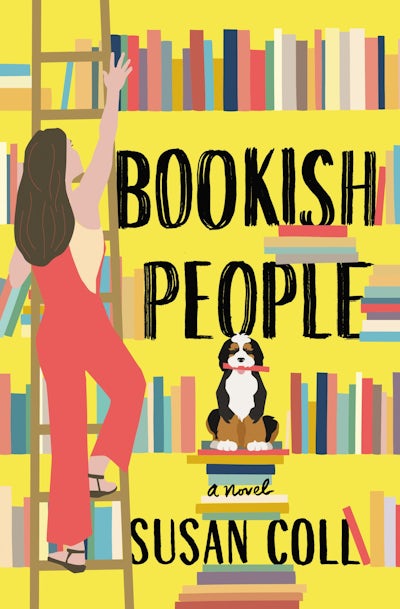TBR [to be read] is a semi-regular, invitation-only interview series with authors of newly released/forthcoming, interesting books who will tell us about their new work as well as offer tips on writing, stories about the publishing biz, and from time to time, a recipe.
Give us your elevator pitch: what’s your book about in 2-3 sentences?
A
vacuum cleaner, events in Charlottesville, a solar eclipse, a couple of Yiddish
jokes I stole from my husband, and an independent bookstore came together to
inspire Bookish People. A
screwball comedy set in Washington DC during one soggy August week, the novel
captures the spiritual depletion of a recently widowed bookstore owner and her
overeducated, underpaid crew of booksellers. They are caught in the middle of a controversy: A reviled British
poet who is scheduled to appear at the store has just been cancelled because of
his misogynist behavior. What is a progressive bookstore owner to do?
Which
character did you most enjoy creating? Why? And which character gave you the
most trouble, and why?
I have begun
answering this question about six times now, and I’m still not satisfied with
the answer. I feel I ought to say that I most enjoyed writing Sophie, the
bookstore owner, or Clemi, the events manager, both of whom I can relate to,
and who I understand intuitively because they are each, in a way, a little bit
of me. But in the end, I confess that I had the most fun writing Raymond
Chaucer, the misogynistic poet who, in the pages of this book, is on one long
bender. He’s on tour for his new poetry collection, and he’s been cancelled
before being cancelled was even a thing. The reading public believes that he is
responsible for his wife’s suicide, and he’s being compared to Ted Hughes. Fun
fact: Raymond appeared in my previous novel, The Stager, in the context of his other, other
family. He has a complicated life.
Raymond was
also the most difficult character to write. I worried that he was too dark, and
that he might alienate readers. My editor suggested cutting his point of view,
which I did, but then I found I missed him, so I wound up sticking bits of him
back in.
Tell us a
bit about the highs and lows of your book’s road to publication.
It’s never easy,
this publishing thing, and each book is its own challenge. I had the same agent
for nearly 20 years and had also worked with the same editor for more than a
decade. My editor’s namesake imprint
folded, and I switched agents, all of which was somewhat traumatic. Also my timing
wasn’t the best—shortly after the book went out on submission, the pandemic
began, and for months I didn’t hear anything. But in the end serendipity
prevailed: My new agent learned about a new imprint at Harper, and he sent the
manuscript off. I am incredibly
fortunate to have found an amazing editor who made this a much stronger book
and am grateful for this fresh start.
What’s your
favorite piece of writing advice?
It sounds
cliché, and it is cliché, but write because you love to write, and because you
have to write, and because you love the bookish life, and not because you think
the outcome will be life-changing. Even if the stars align for you and your
book, the challenges will keep coming, and it’s important to stay centered and
remember why one writes.
My favorite
writing advice is “write until something surprises you.” What surprised you in
the writing of this book?
I love that
advice! In my previous novel, The Stager, I was taken by surprise when
the pet rabbit in the book began to talk. I used to roll my eyes when I heard
authors say that their characters took on lives of their own, but in this case
the rabbit quite assertively inserted himself into the narrative and had a lot
of things to say. I had a similar experience in Bookish People, when the
vacuum cleaner developed a distinctive personality. Ditto for the Russian
Tortoise, Kurt Vonnegut Jr. I suppose the common thread here is that animals
and inanimate objects ought not be underestimated in their supporting roles.
What’s something about your book that you want readers to
know?
I hope readers
come to the book understanding that it’s intentionally screwball, with a lot of
manic action and zaniness.
Inquiring foodies and hungry book clubs want to know: Any food/s associated with your book? (Any recipes* I might share?)
There is, alas, a lot of unhealthy food: Buffalo Ranch Pringles and French fries are consumed, as is craft beer and a couple of skim cappuccinos.
Two party
scenes feature distinctive alcoholic beverages: Malort, a famously foul-tasting
spirit from Chicago, is chugged in the opening scene. The penultimate chapter
features a solar eclipse cocktail called Penumbra Punch, which includes three
different kinds of rum from a private Bermuda reserve, pineapple juice, and
grenadine. There might be more ingredients, but my character is interrupted
mid-sentence, so we’ll never know what else is in there.
****
READ MORE
ABOUT THIS AUTHOR: www.Susancoll.com
ORDER THIS
BOOK FOR YOUR OWN TBR STACK: https://www.politics-prose.com/book/9781400234097
